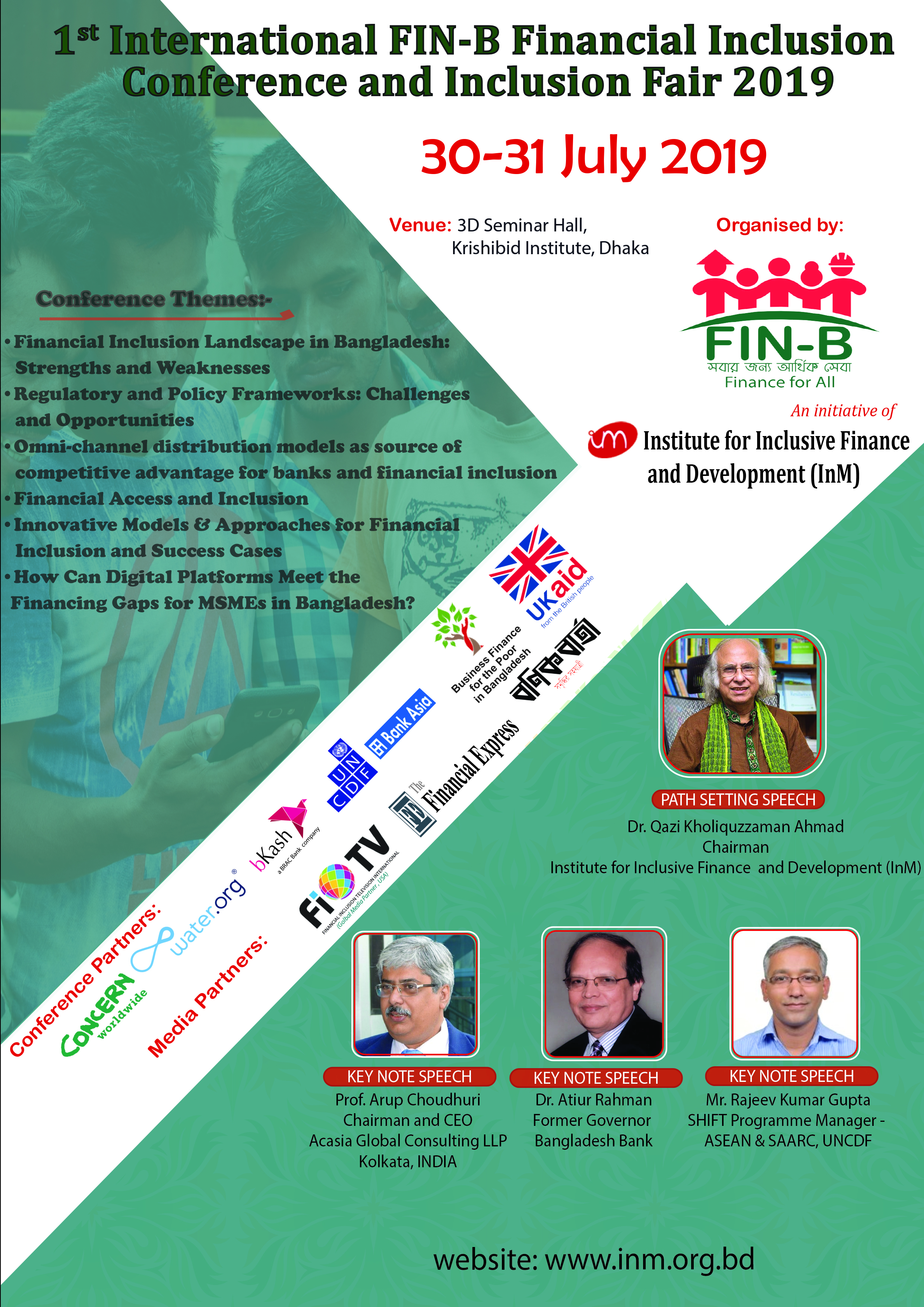
The 1st International FIN-B Financial Inclusion Conference and Inclusion Fair 2019 will take place on 30-31 July 2019 at 3-D Seminar hall, Krishibid Institute Bangladesh (KIB), Dhaka. The Conference will give significant opportunities of cross learning across the diverse audience covering policy makers, financial experts, practitioners, academicians, and the people at large over many complex issues and challenges facing financial inclusion for all. Through a rigorous review process, total 15 (fifteen) papers have been accepted for presentation. The abstract of the papers (along with short bio and picture of the authors) is given below:
Financial Inclusion Index at District Levels in Bangladesh: A Distance-based Approach
Md. Rashel Hasan and Md. Ezazul Islam
Chief Economist’s Unit, Bangladesh Bank, Dhaka
Abstract
The study computes an index of financial inclusion (IFI) of Bangladesh at the district level by using a distance based approach and incorporating different dimensions of inclusive finance. The IFI indicates that most of the districts of Bangladesh have experienced significant progress in financial inclusion over the period, 2008 to 2018. Furthermore, the financial inclusion map reflects that the process of financial inclusion has accelerated at the end of 2010, after the inclusive finance policy initiatives undertaken by the Bangladesh Bank. The index has policy implications to pursue inclusive growth for reducing regional disparities to meet the Sustainable Development Goals (SDGs) in Bangladesh.
Authors Bio

Rashel Hasan is a Joint Director at Bangladesh Bank. He joined there in 2010 and currently working under Chief Economist’s Unit. Previously he served as Research Fellow at ICDDR,B during 2009-2010. Prior to joining ICDDR,B, Hasan worked for NGO Forum, a national NGO. His research focuses on financial development, financial inclusion, civil war and food insecurity. His work has been published in several international journals. Hasan has a MA in Development Studies (major in development economics) from the Erasmus University Rotterdam, the Netherlands and also have MSc and BSc in Applied Statistics from University of Dhaka.

Dr. Md. Ezazul Islam works at Chief Economist Unit's, Bangladesh Bank as General Manager since 2016. Prior to his current position, he was Research Economist at Policy Analysis Unit of Bangladesh Bank. He looks after the area of monetary policy, finance and economic growth, and economic research. His current research interest includes monetary transmission mechanism, financial inclusion, and macroeconomics. He published many articles on monetary transmission channels, interest rates, banking, financial inclusion and growth in referred Journal. He earned Ph.D degree on monetary economics.
Foyasal Khan
PhD Candidate
Department of Economics, International Islamic University Malaysia
Abstract
Although some initiatives like Grameen Bank and BRAC are globally cited as the successful models of social entrepreneurship (SE), the concept and application of SE is still in the embryonic stage in Bangladesh. Suitable policy framework for the growth of SE is still missing in Bangladesh. Over the past decades, profit-driven large and medium enterprises have grown across Bangladesh; but SE has been ignored that provides services to the society, solves community problems and improves the social condition of the mass people. Though a number of NGOs (Non-Government Organisations) and NPOs (Non Profit Organisations) have been working to provide solution to social problems, they are facing wide ranging challenges in terms of funding, operation and management. Operation on a long term basis may not be sustainable for those NGOs and NPOs which primarily depend on charitable sources. Despite all challenges, in a culturally and linguistically analogous country like Bangladesh, promoting and incentivising SE could be one of the best solutions to solve pressing social problems such as unemployment, poverty and extreme inequality. The SEs may provide a way for social and financial inclusion. The paper analyses existing models and trends of SE available in Bangladesh and concludes with a set of recommendations to develop policy roadmaps for encouraging SEs which are not only economically viable but also socially sustainable.
Author Bio

Foyasal Khan currently holds a position as a national consultant on ‘Islamic finance’ at the United Nations Development Programme (UNDP), Bangladesh. In April, 2019, he submitted his PhD thesis in economics at the International Islamic University Malaysia (IIUM). He also completed a master in economics (2013) from IIUM. He obtained his Bachelor of Economics (2009) and Master of Economics (2010) from the University of Dhaka (DU). He was the founding president of IIUM UNESCO Club and led Economics Study Center (2006-2008) at DU. His research interests include Social financing for SDGs, Economics of Islamic banking and finance etc.
Dr. Md. Ezazul Islam, Mst. Nurnaher Begum, and Raju Ahmed
General Manager, Chief Economist Unit; Deputy General Manager, Research Department; Assistant Director, Chief Economist Unit; respectively, Bangladesh Bank, Dhaka.
Abstract
The paper reviews the current state of financial inclusion landscape in Bangladesh to find out strengths and weaknesses. The analysis shows that financial inclusion has been broadened and scaled up many fold over the last ten years. The study finds that the major strengths are the marginal farmers, sharecroppers, and women entrepreneurs who were excluded or underserved can access financial services due to pursuing credit policy of agricultural and CMSMEs, and scale up financial inclusion through agent banking and MFS in rural areas. The paper also highlights some weaknesses such as ‘the missing middle’ segment of MSMEs, existing higher interest rates, very low insurance coverage and delays to adopt NFIS which are critical for broadening financial inclusion in future.
Authors Bio

Dr. Md. Ezazul Islam works at Chief Economist Unit's, Bangladesh Bank as General Manager since 2016. Prior to his current position, he was Research Economist at Policy Analysis Unit of Bangladesh Bank. He looks after the area of monetary policy, finance and economic growth, and economic research. His current research interest includes monetary transmission mechanism, financial inclusion, and macroeconomics. He published many articles on monetary transmission channels, interest rates, banking, financial inclusion and growth in referred Journal. He earned Ph.D degree on monetary economics.

Mst. Nurnaher Begum works at Research Department, Bangladesh Bank as Deputy General Manager since 2013. Prior to his current position, he was Joint Director at the Research Department. She looks after the area of monetary policy, exchange rate policy and macroeconomic economic growth and issues. Her current research interest includes monetary and financial stability, financial inclusion, and exchange rate. She published many articles on banking, reserve management, exchange rate and remittances in referred Journal. She earned post graduate degree on economics.

Raju Ahmed works at Chief Economist Unit's, Bangladesh Bank as Assistant Director since 2016. He looks after the area of fiscal and capital market affairs. His current research interest includes fiscal financing and monetary policy, banks deposit behaviors and interest rates, and financial inclusion. He earned post graduate degree on economics.
Major General Sheikh Md. Monirul Islam (retd.), Tonoya Imam, Shadman Jamal, and Md. Noor E Alam
Regulatory and Corporate Affairs Department, External and Corporate Affairs Division
bKash Limited, Dhaka
Abstract
The paper explores how the use of innovative technology and persistent regulatory engagement creates a financial ecosystem that can ensure higher levels of compliance functions of Mobile Financial Services (MFS) as set by international and local regulatory bodies including Anti-Money Laundering & Combatting the Financing of Terrorism (AML&CFT). The evolution of compliance practices, as well as how competition policy for market players and consumer protection has shaped the MFS industry are also examined with special focus on bKash since its inception in 2011. In the process, it highlights the expansion of the scope of MFS providers that has occurred as a result of intimate engagement of the regulator as well as rapid technological innovations and advancements. The analysis further delves into the constraints posed to MFS practitioners by the regulatory provisions and how the regulator together with MFS providers in general and bKash in particular have worked in tandem to overcome those with synchronised application and interfacing of appropriate technology. Finally, it explores the opportunities that may arise from innovative technology within the framework of the regulations both from commercial and compliance perspectives. The conclusions stress on the need for intimate engagement of the regulator and the MFS providers for effective capitalisation of the technological advancements that would further accelerate financial inclusion, and meet the banking needs of the common people. The expanded outreach of payment systems, however, would have to be coupled with strict compliance measures. Consequently, the best practices will lead to higher transparency, as well as increased scope for commercial expansion creating a scenario benefitting the overall economy of Bangladesh.
Authors Bio
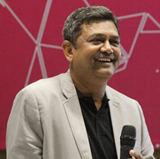
Major General Sheikh Md Monirul Islam (retd) is the Chief External & Corporate Affairs Officer of bKash Limited since May 2014. He is responsible to oversee the external, corporate and regulatory affairs of bKash Limited. He is also responsible for the implementation of regulatory compliance of the company. He has served in Bangladesh Army for 34 years with the experience of commanding two Infantry Divisions in the rank of Major General. He also served as the Director General of National Security Intelligence (NSI), Special Security Force (SSF) and Government Think Tank - Bangladesh Institute of International and Strategic Studies (BIISS). He was an instructor in Defense Services Command & Staff College and Bangladesh Military Academy. He held the appointment of Chief of Protocol of Bangladesh on deputation to the Ministry of Foreign Affairs. In addition to his current appointment, he is also the Chief Anti-Money Laundering & Compliance Officer (CAMLCO) of bKash Limited.
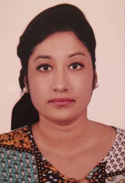
Tonoya Imam achieved her master’s degree with distinction in Information Systems from Manchester Metropolitan University (UK), and her bachelor’s degree in Electronics and Telecommunication Engineering from North South University. As a Senior Officer in the Regulatory Management team at bKash Limited, Tonoya’s main duty is to ensure the regulatory compliance of technological services and disruptive technologies prior to their implementation. She acts as the bridge between Technology and Business colleagues, and proposes compliant technological solutions where applicable. She has prior experience in teaching Ordinary Level Physics at a private English medium school. During her undergraduate course, she worked part-time as a Public Speaker for Global Alliance for Homeland Security, Bangladesh to represent the voice of the nation’s youth.

Shadman Jamal is currently working for bKash Limited in the Regulatory Management Regulatory and Corporate Affairs Department. His work involves evaluating and analyzing local and international regulatory policies to help ensure compliant business practices. Mr. Jamal obtained a Masters in Public Policy from The University of Warwick in January 2018. He also obtained Graduate Diploma in Law in July 2015 from Manchester Metropolitan University, Manchester, United Kingdom. His undergraduate education was at The University of British Columbia in the Bachelor of Arts program majoring in Political Science and minoring in Economics (September 2010-2014), Vancouver, Canada.
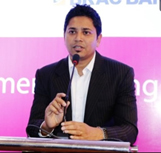
Mr. Md Noor E Alam is a highly professional and goal driven individual who has a spectacle corporate career spanning over 14 years. He completed his secondary education from Jhenidah Cadet College and then graduated from University of Dhaka. During his period of completion of MBA at BRAC University he started his career at aamra networks limited. From there he moved on to Citycell and later on Qubee rising to through the corporate ladder. He started his journey with bKash from 2014 and is currently working as Deputy General Manager in the Regulatory of Corporate Affairs department. He specializes in strategic planning and high impact sales.
Md. Arfan Ali
President and Managing Director, Bank Asia Limited, Dhaka
Abstract
The study examines technological innovations including internet banking, mobile banking, automated teller machines, block chain, BACPS, RTGS and softwares for expanding financial inclusion in Bangladesh. Agent banking is adopted as a means of providing limited scale banking and financial services to the underserved population through engaged agents under a valid agency agreement, rather than a teller/ cashier. Moreover, digital financial services include electronic payments systems (P2P, P2B, B2B, G2P etc.) and electronic banking products and services. Besides, the cost of using cash in Bangladesh is estimated at about Tk. 9,000 crore every year. Technological innovations, agent banking and digital financial services are likely to economise these costs and create new opportunities for inclusion growth in Bangladesh.
Author Bio

Mr. Md. Arfan Ali is the current President & Managing Director of Bank Asia Ltd. A career banker, Mr. Ali, is an MBA from the Institute of Business Administration (IBA), University of Dhaka. He has worked for both local and international banks and possesses more than 25(twenty-five) years of diverse experience in banking profession to his credit. He pioneered and championed Agent Banking operations in Bangladesh with a view to serving a wide range of unbanked and underserved population all over the country. He is also the Secretary General of the Association of Bankers, Bangladesh Limited (ABB) and the current Chairperson of the SWIFT Members & Users Group of Bangladesh.
Galib Ibn Anwarul Azim
Project Officer, United Nations Capital Development Fund (UNCDF), Dhaka
Abstract
Regulatory sandboxes have emerged as useful mechanisms to trial disruptive digital finance innovations minimising risks in a controlled environment. Bangladesh’s transitioning digital finance market is growing rapidly since 2017 after major policy revisions, diversity in service offerings, and adoption of emerging technologies in the ecosystem. Promoting FinTech-led innovations at this stage requires supportive regulatory initiatives; and a sandbox framework can provide enabling space allowing innovators to test their solutions in a controlled environment, help regulators identify risks and resolve regulatory uncertainties for new entrants. This scoping study explores a suitable sandbox model for the Bangladesh context, features and operational considerations to be adopted in the design, coordination strategies among multiple regulators and immediate next steps for designing and launching a sandbox model. The findings suggest a product testing sandbox will be the best fit, allowing thematic/issue based experiments if required. The model should: (i) have support mechanisms similar to an innovation office; (ii) provide cross-sector testing opportunities supported by multiple regulators; and (iii) target high volume driver sectors and last mile customers. Adequate preparation and resource deployment from the design phase, strengthened intra and inter agency coordination mechanism, internal capacity building of staffs and buy-in of senior leadership, effective outreach strategies and flexible intake models will enable successful operation of the sandbox model during early stages.
Author Bio

Galib Ibn Anwarul Azim is a passionate development practitioner currently serving United Nations Capital Development Fund (UNCDF) supporting implementation of financial inclusion projects in Bangladesh. Galib had prior roles in Bangladesh Bank, Institute of Public Finance in the Bangladesh Ministry of Finance and private sector consultancy firms. His areas of interest include digital financial inclusion, green and sustainable finance, social protection and digital innovations. Galib obtained bachelor’s and master’s degree in Economics from the University of Dhaka, Bangladesh. He also holds M.A. in Development Studies obtained from the Institute of Development Studies (IDS), University of Sussex, United Kingdom.
Prashanta Kumar Banerjee and Md. Zakir Hossain
Professor, Bangladesh Institute of Bank Management (BIBM), Dhaka and Ph.D. Fellow, Accounting and Finance, University of Western Australia, respectively.
Abstract
The paper investigates whether a bank-based financial inclusion is significant to promote economic growth in Asian economies. The model uses loans, deposits and the number of banks as a measure of financial inclusion. We document access to financial services, particularly loans and deposits, as the key driver of economic growth. Our result suggests that when a bank branch is established, it takes about four years to have a positive impact on GDP. Empirical evidence shows that the effect of financial inclusion is more noticeable in relatively developed economies. However, a higher level of corruption negatively influences the association between financial inclusion and GDP growth in Asia. In effect, the effectiveness of government policy formulation and implementation is weak in most of these countries which drives away the potential benefits of financial inclusion. Furthermore, our analysis suggests a financial crisis does not have a direct bearing on the underlying structure of Asian economies. Finally, we find Basel regulations do not impede the extent of financial inclusion; rather higher capital ratios positively interact with the extent of financial inclusion to increase GDP.
Authors Bio

Dr. Prashanta Kumar Banerjee is Professor and Director (RD&C) at Bangladesh Institute of Bank Management (BIBM). He served King Faisal University, Kingdom of Saudi Arabia during 2009-2011. He completed his Ph.D. in Finance from the Punjab University, India and did Post-Doctoral Research in Corporate Finance under Senior Fulbright Scholarship in the United States of America. Currently, he is the Treasurer of the Executive Committee of Fulbright Alumni Association of Bangladesh and member of Southern Economics Association, USA. Dr. Banerjee has published several articles in peer reviewed US, European and Asian journals including Empirical Economics, The Journal of Energy and Development, Southwest Business and Economics Journal, Journal of Developing Areas, etc.

Md Zakir Hossain is a PhD scholar at The University of Western Australia (UWA), Perth Australia. His research interests are corporate finance, disclosures and banking regulation. Before joining to PhD cohort at UWA, he has completed MPhil degree in Economics and Finance from Curtin University. He is the recipient of several awards and scholarships from UGC, University of Rajshahi, Curtin University and UWA. His research has been published in Applied Economics, an ‘A’ ranked journal in ‘ABDC’ journal list.
Muhymin Chowdhury and Mahbubur Rahman
Deputy Challenge Fund Manager, Deputy Challenge Fund Manager
Abstract
Nathan’s market insights show that maximizing returns between a financial institution and its customer is significantly increased through Omni Channel Banking. During the last few years, an increasing number of financial institutions have launched numerous digital and branchless banking initiatives targeting retail and SME customers due to a saturation in the corporate finance segment. The session will discuss how financial institutions can maximize customer value and experience by offering the same suite of products and service across all its delivery channels through stronger targeting using data analytics.
Authors Bio

Muhymin has worked in the development sector for over 10 years with a focus on initiatives that improve access to financial services. Currently at Nathan Associates, Muhymin manages a diverse portfolio of micro and small enterprise centered projects focusing on enhancing investment readiness, establishing last mile distribution channels, and developing new products and platforms. Previously he managed a $10m grant investment in bKash Ltd to strengthen the company’s capacity in the area of strategic and operational planning, customer uptake, building the agent network and more.
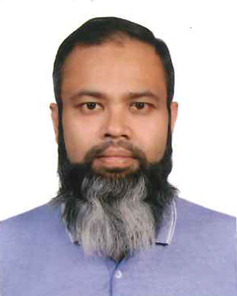
Mahbubur Rahman has 16 years of experience in Banking, NBFI, Telecommunication industry. He worked in different capacities in Retail and SME Banking segments in Standard Chartered, BRAC Bank Ltd., ICB Islamic Bank Ltd and LankaBangla Finance. He had completed his business graduation from Jahangirnagar University and MBA (major in Finance) from Dhaka University.
Nahid Akhter and M. A. Baqui Khalily
Senior Research Associate, Institute for Inclusive Finance and Development (InM), Dhaka and Former Professor of Finance Department, University of Dhaka and former Executive Director of InM, respectively.
Abstract
Technology and innovations have positive impacts on production and efficiency, and in turn, on growth at the macro level and institutional performance at the firm level. Mobile technology is a relatively new technology in Bangladesh which started since 2011. The findings show that mobile financial services have brought major changes in financial products and institutional structure in the financial services market. Mobile technology is one of the financial innovations, which has multi-dimensional impacts. The result shows that it significantly improves efficiency and financial inclusion. The services have the ability to reach the excluded low-income individuals and micro and small entrepreneurs. This can have wider impact including growth and poverty reduction as well as higher financial inclusion. The findings do suggest that the role of banks and MFIs to expand services in inaccessible areas can be effective, if they are complemented by mobile money and appropriate regulatory framework.
Authors Bio

Nahid Akhter is a Senior Research Associate at InM. She holds a Master's and Bachelor's degree in Economics from Jahangirnagar University with outstanding results. Her research works include various development issues, like, women empowerment, impact analysis of migration and remittance earning on poverty, financial inclusion, mobile financial services, micro insurance, multidimensional poverty analysis, rural finance, microfinance, inequality and so on. She has strong knowledge and experience in developing survey instruments, conducting statistical analysis, research report and article writing, seminar presentation and so on. She has published papers in internationally accredited journals.
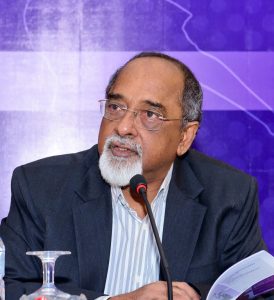
Professor M.A. Baqui Khalily was the founding Executive Director of the Institute for Inclusive Finance and Development (InM). Prior to his joining the Institute, he was Professor of Finance at the University of Dhaka. Currently he teaches at the University of Asia Pacific, and works as a Freelance Consultant. He has worked for World Bank, ADB and other international organisations as a consultant. Educated in Dhaka, he received his Msc degree and PhD in Agricultural Economics with major in Rural Finance and Banking from the Ohio State University, USA. His research areas include financial markets, sustainability analysis, rural finance, microcredit, entrepreneurship development, corporate governance and capital market.
Farhana Nargis and Shah Md. Ahsan Habib
Research Fellow, Institute for Inclusive Finance and Development (InM),
Dhaka and Director Training, Bangladesh Institute of Bank Management (BIBM), Dhaka, respectively
Abstract
Access to formal finance is a powerful tool for improving the economic conditions of the poor. However, developing appropriate products and ensuring their actual use by the vulnerable groups depend on several conditions under which the formal financial sector operates: constraints and challenges faced by the vulnerable and excluded individuals; excluded groups’ preferences for financial services; and policy and regulatory support for service expansion. This qualitative study brings out the challenges and the policy and regulatory issues to develop appropriate products for the vulnerable and disadvantaged groups like char and haor residents, tribal residents, tea garden workers, transgender, and physically challenged population. It also identifies the present scenario of vulnerable excluded groups in terms of their characteristics, needs, choices and constraints, which are not met by the current financial services in order to understand the main reasons of exclusion from basic financial services provided by the formal institutions of Bangladesh. There is no doubt that adequate policy and regulatory supports are crucial for necessary product development and the vulnerable sections must be supported in different phases for graduation. Especially, policy and regulatory support are crucial to develop much needed micro saving, micro lending and micro insurance products/services. The study suggests that extensive awareness and motivation programmes both along the demand and supply sides could contribute a lot for effectiveness of the inclusive financial products.
Authors Bio

Dr. Farhana Nargis is a Research Fellow of InM. Her principal areas of expertise are Production Economics, Agricultural Finance, Poverty, Financial Inclusion and Rural Credit Market. She has been extensively published numerous articles in reputed journals during her young career life. She has an excellent field survey experiences with farmers, rural households and rural microenterprises in developed and developing countries. During her stay at InM, she is working independently as well as with team members of various projects by analyzing data, report and article writing and so on. Dr. Nargis has earned her MS in Production Economics from Bangladesh Agricultural University and Ph.D in Agricultural Economics from Sunchon National University, South Korea.

Dr. Shah Md. Ahsan Habib is a Professor Selection Grade and Director of Training and Certification Programs of Bangladesh Institute of Bank Management (BIBM). He obtained his Phd from Banaras Hindu University, India under BHU Research Scholarship; and accomplished Post Doctoral Fellowship from Syracuse University, USA under Senior Fulbright Scholarship. He is having teaching experiences with Institute of Business Administration and Department of International Business of the University of Dhaka; East West University; Brac University and University of Professionals. Dr. Ahsan has more than 150 research publications in different national and international journals/books. Dr. Ahsan is the author/lead author of the books ‘Financial Globalization’, ‘Environmentally Responsible Banking in USA’, ‘Towards Knowledge Society’, ‘Green Banking in Bangladesh’, ‘Trade Services by Banks in Bangladesh’. He is a columnist of the national dailies and published over 160 newspaper features in the national daily newspapers. He has been playing editorial roles for the following publications: ‘BIBM’s Policy Brief’; ‘Green Biz of the Green Tech Foundation’; ‘Risk Enlightenments’; ‘Banking Review Series’, ‘Banking Research Series’, and ‘Bank Parikrama’.
Farah Muneer
Senior Research Associate
Institute for Inclusive Finance and Development (InM)
Abstract
While there are many programmes and campaigns to stop child labour, the fact remains that they still continue to work. This is a common phenomenon especially in under developed and developing world. Therefore, savings initiatives for vulnerable street and working children have been garnering policy attention so that they can be brought under financial services. This paper addresses few key issues regarding the saving behaviour of working street children; i) What are the key characteristics of the children who save; ii) How pattern of expenditures are different from male child and female child, iii) What factors influence the saving performance of children with respect to gender, and finally iv) What are the policy challenges need to be addressed if working children are given financial services. The result shows that gender plays an important role in influencing the working children to save. Female children have 1.8 time higher probability to save than that of male children though they earn less than male children. The analysis shows that female children are more sensible in spending their income. This might contribute to the saving factor. It is also found that the female savers utilise the savings more effectively than male savers. The probability of utilising the savings on consumption increases 5 times for the male children compared to female children.
Author Bio

Farah Muneer is a Senior Research Associate at InM. She holds a Master's degree in Development Economics and Policy from the University of Manchester, United Kingdom. Her research works include various development issues, like, Microenterprise Development, Climate Change Issues and Resilience, Financial Inclusion, Mobile Financial Services, Multidimensional Poverty Analysis and Rural Finance. She has strong knowledge and experience in developing survey instruments and conducting statistical analysis. She has published papers in different national and international journals.
Sadia Sultana, Saila Sarmin Rapti, and Nabila Fahria
Deputy Director, Monetary Policy Department; Assistant Director, Research Department; and Assistant Director, Monetary Policy Department, respectively, Bangladesh Bank, Dhaka
Abstract
This paper investigates data availability for measuring the efficiency of agent banking system in Bangladesh. In order to ensure financial services for the country’s large unbanked masses, it is imperative to analyse whether the country’s agent banking system works efficiently or not. In the study, efficiency is defined for the agent banking system using the conventional theory of efficiency and Bangladesh Bank’s guidelines for agent banking. In light of the definition, salient factors needed to measure efficiency of the agent banking system are identified. Existing data sources are then explored and investigated for data on the efficiency indicators. The findings show that data availability to measure efficiency of agent banking system is very limited, mainly because agent banking is relatively new among the financial inclusion tools in Bangladesh and existing capacity for collecting relevant data is limited. The study recommends steps for making the collection of necessary data feasible for the efficiency indicators. Bridging the gap in data would certainly capacitate us to measure the efficiency of agent banking effectively in future.
Authors Bio
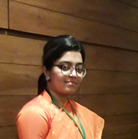
Sadia Sultana is currently working as a Deputy Director in the Monetary Policy Department of Bangladesh Bank. In the five years of her central banking experience, she has worked intensely with secondary data and is very familiar with data sources in Bangladesh’s context. Working in the central bank, she has experienced the significance of availability and reliability of data in taking efficient policy measures. Before joining Bangladesh Bank, she had worked as a Research Associate at the Economic Research Group (ERG). She is an Economics major with a Bachelor’s and a Master’s degree from the University of Dhaka.
 Saila Sarmin Rapti
Saila Sarmin Rapti
started her career as an Assistant Director in Research Department of Bangladesh Bank in 2016. She received her Master’s and Bachelor’s degree in Economics from Jahangirnagar University. From the very beginning of her career, she has been actively involved in data analysis of macroeconomic indicators of Bangladesh and SAARC countries. She has gained valuable knowledge by attending in several training programmes on macroeconomic issues in national and international level. Her current areas of research interest are Macroeconomic modeling and forecasting, regional development, financial inclusion, monetary policy analysis etc.

Nabila Fahria is working as an Assistant Director in Monetary Policy Department of Bangladesh Bank since November, 2016. Before joining Bangladesh Bank she worked as a Pricing Specialist in Robi Axiata Limited. She acquired her Bachelor’s and Master’s degree in economics from North South University and also had working experience as a Teaching Assistant. During her service period in the central bank, she has extensively worked with various secondary data sources and analyzing all the economic indicators in detail. She has worked on macroeconomic and forecasting model and her current interests are monetary and fiscal policy, financial inclusion, development sector etc.
Golam Morshed Mohammed
Assistant General Manager & Faculty Chief
International Programme Department,
Grameen Bank, Dhaka
Abstract
Grameen Bank, as the bank for the poor, treats its borrowers as shareholders; they get dividends and borrow for development of their businesses. Most of the directors of the Bank are appointed from the borrowers which is one of the characteristics of the Grameen business model. Financial and social performances are the key elements in the Grameen business model. The model considers profitability of the branches as the key for ensuring viability and profitability of the organisation. Each branch provides financial services to about 600 active borrowers and each branch is required to mobilise enough deposits to meet its demand for lending. The measure ensures high staff productivity and reduces the cost of borrowing from the head office or other sources. The study highlights that the Grameen model is based on business principles, and does not treat microfinance as a charity. It has to be sustainable. The immediate goal of poverty focused Grameen business model is to reach the poorest and the ultimate goal is to operate on a sustainable basis so that it can have positive impact on the lives of the borrowers and their families.
Author Bio
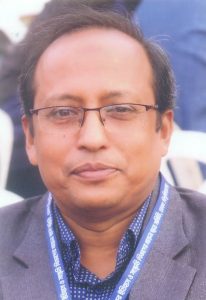
Golam Morshed Mohammed had begun his career as a banker at Nobel Peace Prize winning organization “Grameen Bank”. He has a long thirty years of career experience with this bank as a microcredit practitioner. He had an opportunity to work with Nobel Laureate Prof. Muhammad Yunus since 2004. Currently he is serving as an AGM and Faculty Chief of International Program Department of GB. Morshed has conducted many international training programs and has delivered speech at various seminar and workshop at home and abroad. Morshed holds a B.A (honors) and M.A degree from the University of Dhaka.
Mohammed Arifur Rahman
Chief Executive, YPSA (Young Power in Social Action), Chattogram and
PhD Fellow, Techno India University, India
Abstract
The study investigates how the financial inclusion programme of YPSA facilitates inclusion of Persons with Disabilities (PwDs) in mainstream development. The study is based on primary data collected through key informant interviews (KIIs), case studies, observations and questionnaire surveys. A total 250 households with PwDs were purposively sampled for interviewing at the field level. The results identify a total of seven types of disabilities; 67% with physical disability followed by the visually impaired. About 60% of PwDs do not receive any government allowance and 78% have no government certification as PwDs. More than a quarter of the PwDs are the main earning members in their families. Nearly 79% of PwDs prefer to receive loans to start their own businesses and other income generating activities, while only 30% succeeded in receiving loans from different government and non-government organisations. Among them, YPSA (Young Power in Social Action) is the leading organisation at Sitakund in terms of coverage under financial inclusion programme. The programme for PwDs has different modes of operations and privileges which facilitate accessibility to the targeted groups. The participation in the programme benefits and improves their lives and livelihoods along with contributing towards community development. Both government and non-government organisations should come forward to provide different forms of assistance as well as soft loans with flexible terms and conditions for PwDs to ensure their meaningful financial inclusion.
Author Bio

Mr. Arifur Rahman is a dedicated social entrepreneur and activist. He started his activism since his young age and founded YPSA (Young Power in Social Action) in 1985. YPSA presently a leading organization working for sustainable development. Inclusive financing program for and with the person with disabilities is one of his interest area. He actively involved with different initiatives and networking on social development issues. His research articles published in different journals. He completed master’s degree from Chittagong University and Dhaka University. Presently he is pursuing PhD on Inclusive financing program.
Shajahan Bhuiya and Alamgir Khan
Advisor, Centre for Development Innovation and Practices (CDIP) and
Research and Publication Officer, CDIP, respectively.
Abstract
The study explores how financial inclusion and its expanded coverage can enable an organisation like CDIP to implement piggyback primary health care and education support services for sustainable human development of the organised group members, their families as well as others in the community, particularly the poor, marginalised and disadvantaged women and children. Sustaining programmes on health and education services for them is beset with the problems and challenges of procuring and managing financial, human, and other resources. How the model of piggybacking services works is critically examined in the study along with concurrent examination of the relationships of the credit group members with health and education programmes. The impact of these programmes on potential expansion of financial inclusion in the community is also indicated. The income and expenditure of the programmes for sustainability have also been analysed to test the viability of the model. The study design includes methods like observation, orientation, key informants, focus group discussion, case studies, interviews, study of office documents, review of secondary data sources to collect necessary data and information. The collected data and information are analysed and interpreted to have a preliminary understanding of and an insight into the working of the model that contributes towards mutual reinforcement and symbiosis of financial inclusion and human development programmes for sustainable human development. The results of the study reveal that financial inclusion of the poor, marginalised and disadvantaged people in the community by NGOs enables them to invest their surplus in sustainable human development programmes like health and education to develop people’s wellbeing capability through using the piggyback structure.
Authors Bio

Shajahan Bhuiya is the advisor to Centre for Development Innovation and Practices (CDIP), a national NGO with a vision to be a Trend-setter for innovation and change for sustainable human development. His role as an advisor to CDIP management is to provide necessary inputs to management in terms of advice and involvement in the areas of its education, health and financial services necessary for sustainable human development. His recent books are: Piggyback Social Marketing Strategy For Health Program and An Educational Approach For Inclusion And Quality Improvement. The philosophy of his being is for others and him too.
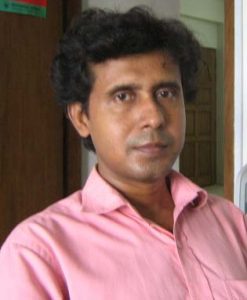
Alamgir Khan, Research and Publication Officer, CDIP, has jointly edited two books: Ganomadhyome Protipholito Shikkhar Chalchitro (Reflections of Education Scenario in the Media, 2006) and Amader Shikkha: Bichitro Bhabna (Our Education: Various Thoughts, 2019). He is Excutive Editor, SHIKKHALOK bulletin and KEYNOTES journal, published by CDIP. Earlier he coordinated the research ‘School Drop-out of Girls and Reproductive & Maternal Health Services’, supported by BNPS and Asia Foundation, 2012; worked as a Research Associate for ‘Non-formal Primary Education Sub-sector Study 20’ under DPE, GoB, 2010; and also worked as a Research Assistant for ‘Performing Arts’ under Asiatic Society of Bangladesh, 2005.
Anitta Mankhin and Sajid Amit
Monitoring Evaluations and Learning (MEL) Manager, Water.org (Bangladesh) and Country Director, Water.org (Bangladesh), respectively.
Abstract
Water and sanitation lending by Water.org through digital financial service (DFS) providers enables borrowers to make loan repayments digitally through agent points, without visiting microfinance branches. The study explores the perceptual benefits and deterrents of digital payment at the household level. Moreover, the paper aims to (a) identify the amount of time and money saved from the use of digital payment; (b) explore causal links to improved water supply and sanitation services and development of women entrepreneurs at the presence of digital payment facility using structural equation modelling. The results show that relatively poor women having proper facility of water supply and sanitation (WSS) can utilise their time in productive work. This clearly indicates that development and survival of women entrepreneurs most likely depend on access water and sanitation products. This is also borne out by case studies. The results contribute positively to the discourse of financial inclusion and women empowerment in Bangladesh.
Authors Bio

Anitta Mankhin holds Master of Finance and Business Economics from the University of Adelaide in Australia and BBA and MBA from the University of Dhaka in Bangladesh. More than twelve years of demonstrated experience in market research, financial modelling and business development plus demonstrable know-how in economic development have given him a solid understanding and multiple perspectives of business policy impact. Currently, Mr Mankhin is working with Water.org in the capacity of Monitoring Evaluations and Learning (MEL) Manager in Bangladesh. His research interests include but are not limited to econometric research, financial analysis and modelling, and economic development.

Sajid Amit is a researcher, academic, strategy consultant and an expert in international development. With regard to international development, he specializes in program design, fund raising, donor relationship management, stakeholder engagement, and in terms of disciplinary areas, financial inclusion and fintech. He has a BA from Dartmouth College (USA), an MA from SOAS, University of London, and an MA from Columbia University (USA). He has prior work experience in Morgan Stanley, KPMG, and BRAC EPL, in the USA, UK, and India.
The panel discussion will highlight the opportunities new digital platforms have brought for innovating financial products to address the gap in MSME financing. The discussion will elaborate:
- How digital platforms can produce bankable data for MSMEs and enable financial service providers utilize the data to develop customized products and services for these segments
- How digital platforms are enhancing customer outreach and profitability through offering efficient business and finance management opportunities for MSMEs
Conference partners |
-
